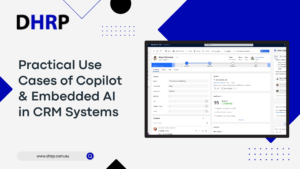If your business is investing in CRM software, a well-executed Dynamics 365 CRM implementation can drive higher revenue. Ultimately, ROI is the key measure of success.
But how you measure it will directly affect the ROI. For example, the right CRM will reduce the hours of repetitive work and save you a significant amount of time.
So, how to turn your CRM investment into a successful investment? Let’s find out.
Why CRM Implementation ROI Matters Right Now
Implementing CRM ROI has evolved from a vanity metric. Boardrooms seek reduced support expenses, increased conversion rates, and shorter sales cycles to save money and time.
AI-driven and Agentic CRM systems are now integrated into contemporary platforms, particularly cloud-first solutions like Dynamics 365. These capabilities generate new value streams through automation, predictive insights, and smarter routing, enabling organisations to optimise their operations.
You’ll miss the true opportunities (and risks) if you don’t measure ROI accurately.
What’s New in Dynamics 365 (And Why it Changes ROI)
- AI in Dynamics 365 CRM: Copilot and role-based AI agents are able to write messages, summarize calls, and suggest the best course of action, converting user time savings into quantifiable productivity.
- Agentic CRM System Thinking: When properly designed, modern implementations are autonomous agents that coordinate tasks across touchpoints (marketing → sales → service), increasing return on investment. They are not merely workflows.
Dynamics 365 CRM Implementation Success Metrics (What to Track)

Make use of these KPIs as the foundation of your “success by design” strategy; each one is a head with dependent measures below it:
1. Revenue and Pipeline
- Net-new revenue from leads sourced from CRM.
- Growth in the cross-sell rate and average deal size.
2. Sales Efficiency
- Time-to-close (shortened by days).
- Monthly opportunities per representative.
3. Customer Experience & Retention
- Net Promoter Score increase, first-contact resolution time, and churn rate change.
4. Operational Productivity
- Automated task completion time saves hours.
- Decrease in error rates and manual data entry.
5. Adoption & process compliance
- Real ROI is driven by active users, feature usage, and the proportion of opportunities that adhere to standard workflows.
How to Run an ROI Analysis of Dynamics 365 CRM Implementation (Practical Steps)
- 1. Baseline Everything: Revenue, lead-to-sale conversion, cycle times, headcount cost per hour, and support expenses.
- 2. Map Benefits to Dollar Values: For example, each representative can close more deals if the cycle is 10% faster, resulting in increased revenue for the business.
- 3. Calculate CRM Implementation Cost (TCO): Licenses, data migration, integration, customisation, training, and continuing assistance. Depending on scale and complexity, implementations in Australia typically range from small pilot projects to major transformations.
- 4. Run a Payback & Sensitivity Analysis: Display the best, worst, and most likely case over a period of 12 to 36 months.
- 5. Embed Success Metrics in Dashboards: For real-time ROI reporting, use Power BI or Dynamics 365 Customer Insights. Although results vary by use case, Forrester/Microsoft studies have demonstrated significant paybacks for Customer Insights scenarios for certain implementations.
On-Premise CRM vs Cloud CRM: What You Need to Consider
- Upfront vs Ongoing Cost: On-premise CRM can work with highly regulated setups, but it usually has a higher long-term total Cost of Ownership (TCO). Cloud-based CRM transfers CapEx to OpEx, usually lowering upfront spend and speeding deployment.
- Scalability & Feature Velocity: Regular feature and AI updates are provided to the cloud (important for AI in Dynamics 365 CRM).
- Compliance & Control: Some industries opt for on-premise or hybrid models for sovereignty, striking a balance between the efficiency gains of cloud-based CRM and regulatory requirements.
In summary, only with careful implementation and measurement can CRM produce a high return on investment.
Why CRM Consulting Still Matters
You can convert business outcomes into configuration, integration, and adoption programs with the aid of CRM consulting. A knowledgeable consulting partner:
- Lowers overruns in CRM implementation costs.
- Uses frameworks such as Microsoft's Success by Design to expedite go-live.
- And transforms AI features into business results that can be replicated.
Consider consulting when estimating costs and return on investment for Dynamics 365 CRM implementation.
Quick 7-Point CRM Implementation ROI Checklist (for Australian Leaders)
- KPIs at baseline before any changes are made.
- Begin with a high-impact pilot (one product line or region).
- Calculate the exact cost of the CRM implementation and consulting.
- For the first six months, track adoption on a weekly basis.
- Profit from the time saved by AI/agentic features.
- Create dashboards that display the effects of costs and revenue.
- Optimise and rerun ROI every three months.
Final Words
The Dynamics 365 CRM implementation in 2025 combines strategic consulting, disciplined measurement (Measuring CRM ROI in Dynamics 365), and astute use of AI to transform the cost of CRM implementation into a steady growth engine.
If you’d like, we at DHRP can help you create a customised dashboard specification that links Dynamics 365 metrics to boardroom KPIs. Alternatively, if you reach out to consult, we can work together to ensure a successful implementation with the right measurements.
FAQs
Businesses can measure ROI by tracking revenue growth, sales efficiency, customer retention, and productivity gains. Mapping benefits to dollar values, embedding metrics in dashboards, and comparing results against CRM implementation costs ensures accurate ROI measurement.
Key metrics include revenue pipeline growth, cross-sell rates, time-to-close reduction, Net Promoter Score, churn rate, task automation savings, error reduction, and CRM adoption levels. Together, these metrics provide a comprehensive measure of ROI success.
ROI analysis is essential to justify investment, optimise resources, and reveal actual business impact. Without measuring ROI, businesses risk overlooking automation, predictive insights, and efficiency gains that Dynamics 365 and agentic CRM systems deliver.



































































































